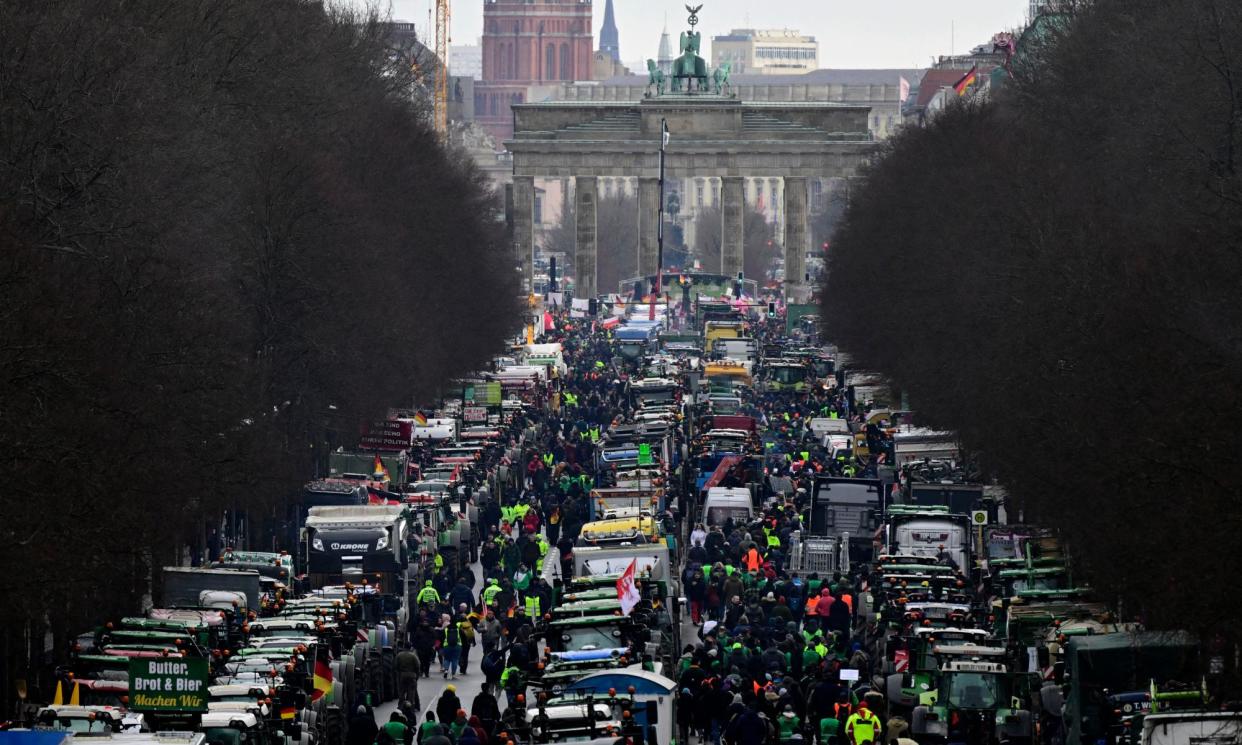Thousands of tractors block Berlin as farmers protest over fuel subsidy cuts

Thousands of tractors have brought Berlin’s city centre to a standstill as farmers from across Germany protested on parliament’s doorstep over rising costs and a plan to phase out agricultural fuel subsidies.
An estimated 30,000 protesters, including farmers supported by a wide range of representatives from other industries from fishing to gastronomy to logistics, blocked the streets around the government quarter on Monday with their vehicles, including lorries and forklift trucks, and even children’s toy tractors.
Joachim Rukwied, the president of the German farmers’ union, called on the government to scrap its plans to phase out fuel subsidies, warning that many farmers would be driven to bankruptcy by the decision.
“The government has the ability to change this,” he told thousands of protesters gathered at the Brandenburg Gate, adding: “This much is too much. Take back the proposals.” As soon as the government signalled it was prepared to backtrack, Rukwied promised, “the tractors will be withdrawn”.
Christian Lindner, the finance minister and the main force behind the decision to cut the fuel subsidy, was greeted with loud boos and whistles as he took to the stage to address the rally.
Related: Germany on track for two-year recession as economy shrinks in 2023
“Your protest is legitimate and your protest is peaceful,” he told the protesters, praising their “cohesion”. But his words were hardly heard above the angry tumult.
He acknowledged that anger among farmers went beyond the diesel subsidy. “Something has been brewing for decades,” he said. “We need to talk.” He added that a “new phase” had arrived, “in which we need to speak afresh about what the function of the state is”.
The demonstration marked the culmination of a week of protests across the country that have attracted a growing number of workers from other fields, including thousands of trades people from heating engineers to plumbers, angry over high energy costs, mounting bureaucracy, high add-on labour costs and a lack of consultation.
Representatives of the hospitality industry in attendance are demanding the government withdraw its recent VAT increase on restaurants from 7% to 19%.
Entering the German capital on Sunday night, tractors blared their horns and shone headlights, with one farmer revving a chainsaw, prompting furious confrontations between protesters and Berliners angry at having their sleep disrupted.
Similar, smaller-scale protests took place across the country, blocking main transport arteries. The protests also spread to storage and packing facilities belonging to Amazon, where workers have recently demonstrated against allegedly poor working conditions, and the discount supermarket chain Aldi, in what were seen as expressions of broader feelings of discontent towards the government.
Related: Why Europe’s farmers are protesting – and the far right is taking note
The far-right populist Alternative für Deutschland has been blamed for contributing to the angry mood. Its accusations towards the government of cronyism, embezzlement and war-mongering were reflected in many of the banners and speeches visible on Monday.
Some protesters called for the dissolution of government and for new elections, holding aloft lifesize models of government figureheads calling them the “hostage takers of our country”. Others held up the slogans: “Empty tanks – the game’s over”, “Without farmers there’s no future”, and “Transport made in Germany – but for how much longer?”
About 1,300 police were in attendance.
The agriculture minister, Cem Özdemir of the Greens, who has largely sided with the farmers, and blamed Lindner, of the pro-business Free Democratic party, for a poorly communicated policy switch, told German television before the rally: “The problem is not just the question of agricultural diesel. The problem is that no one spoke to them about it.”
He said the protesters had finally achieved the feat of putting issues such as the pivotal role of farmers in the food supply chain at the top of the political agenda.
Some protesters had arrived with vehicles piled high with manure that they planned to dump at the door of the Bundestag, the parliament building close to Brandenburg Gate. But they were dissuaded from doing so in last-minute negotiations between police and organisers.


